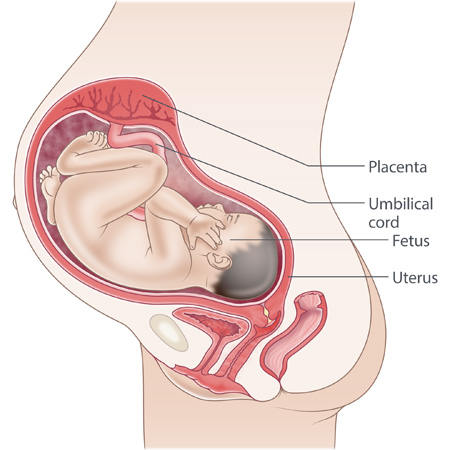You at 34 weeks pregnant
You’re probably feeling more and more uncomfortable as your baby’s weight continues to increase. Healthy eating and regular exercise might help you feel better. Keep doing your pelvic floor exercises.
Try to sleep on your side when you can – you can sleep on either side. This reduces your risk of stillbirth. It’s OK if you wake up during the night on your back. Just roll over to sleep on your side again. Putting pillows under your stomach, between your legs and behind your back can help you to feel more comfortable and ease or prevent back pain.
It’s common to gradually get swollen hands and feet at this stage, especially in warm weather. It can help to put your feet up when you’re resting and avoid wearing rings.
You might notice more Braxton Hicks contractions now.

Rh type
A blood test done earlier in pregnancy will let you know your Rh type.
If you’re Rh-negative and your baby turns out to be Rh-positive, this is OK for this baby. But it might cause serious health problems in any babies you have in future.
But no-one knows what your baby’s blood type is until after birth. So if you’re Rh-negative, you’ll be offered a special injection called Anti-D at your 26-28 week antenatal appointment and your 34-36 week appointment.
You’ll also be offered Anti-D if you have bleeding during pregnancy. This reduces the risk of health problems for future babies.
After your baby is born, blood is collected from your baby’s umbilical cord and the Rh type is checked. You’ll be offered another Anti-D injection if your baby is Rh-positive.
Ask your midwife or doctor for more information.
Pre-eclampsia
Pre-eclampsia is a serious condition that sometimes occurs after 20 weeks of pregnancy.
If you have pre-eclampsia or another reason for a complex pregnancy, you might need to see your health professionals more often from now. You might also need to have an extra ultrasound scan.
Symptoms of pre-eclampsia include:
- severe headache
- pain in your tummy area
- changes in your vision – for example, blurred vision
- high blood pressure and protein in your urine
- sudden swelling of the face, hands or feet.
Your baby when you’re 34 weeks pregnant
Your baby is continuing to grow and develop:
- Your baby is about 30 cm from head to bottom and weighs about 2.1 kg.
- Your baby’s immune system is developing.
- Your baby can swallow up to 1 litre of amniotic fluid a day and pass the same amount of urine.
- Your baby can do big kicks and roll over. This might feel a bit uncomfortable for you.
Your baby’s movements should continue to be regular and strong. If you notice a change in your baby’s movements, contact your midwife, doctor or hospital straight away.